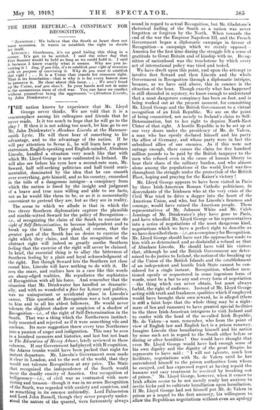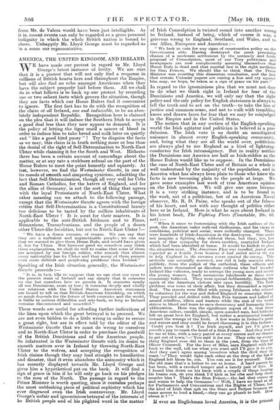THE IRISH REPUBLIC.—A CONSPIRACY FOR RECOGNITION.
" JENNINGS ! We believe that the South at heart does not. a-ant secession. It wants to establish the right to decide for itself. Ltucot..1; : Gentlemen, it's no good hiding this thing in a corner. It's got to be settled. I said the other day that Fort. Sumter would be held as long as we could hold it. I said it because I know exactly what it means. Why are you in- vesting it ? Say, if you like, it's to establish your right of secession with no purpose of exercising it. Why do you want to establish that right ? . . . It is a 'Union that stands for common right. That is its foundation—that is why it is for every honest man to preserve it. Be clear about this issue. . . . Ws won't break up the Union, and you shan't. In your hands and not in mine is the momentous issue of civil war. You can have no conflict without yourselves being the aggressors."—(Abraham Lincoln, by John Drinkwater.)
THE nation knows by experience that Mr. Lloyd
George never thinks. We are told that it is a commonplace among his colleagues and friends that he never reads. Is it too much to hope that he will go to the play ? If then it is not asking too much, let him go to see Mr. John Drinkwater's Abraham Lincoln at the Hammer- smith Lyric. He will there hear of something to his advantage, and to the advantage of the nation. If he will pay attention to Scene ii., he will learn how a great statesman, English-speaking and English-minded, Abraham Lincoln, handled a situation very much like that with which Mr. Lloyd George is now confronted in Ireland. He will also see before his eyes how a second-rate man, Mr. Seward, half self-seeking politician and half timid senti- mentalist, dominated by the idea that he can smooth over everything, gets himself, and so his country, enmeshed in the toils of a dangerous intrigue—a conspiracy from which the nation is freed by the insight and judgment of a brave and true man willing and able to see facts, not as he would like them to be, or as it is momentarily convenient to pretend they are, but as they are in reality.
The scene to which we allude is that in which the two clever Southern diplomatists capture the plausible and nimble-witted Seward for the policy of Recognition- i.e., of recognizing the claim of the South to exercise the right of Self-Determination, to become independent and to break up the Union. They plead, of course, that the greater part of the South has no desire to exercise the right which they claim, and that the recognition of the abstract right will indeed so greatly soothe Southern feeling that the exercise of the right will never be claimed. In brief, the essential thing is to allay the bitterness of Southern feeling by a plain and loyal acknowledgment of the right. But though Seward lets the Southern net close round hint, Lincoln will have nothing to do with it. He sees the snare, and realizes how in a case like this words are sharp-edged realities. He repudiates the sophistries of Recognition with all his force. And remember that the situation that Mr. Drinkwater has handled so dramatic- ally, and with an wonderful a flair for h.story and politics, was no unimportant or accidental phase in Lincoln's career. This question of Recognition was a test question to him and to all his ablest followers. He would never tolerate the slightest shadow or suspicion of a shadow of Recognition—i.e., of the right of Self-Determination in the South. That was a thing which the Northerners instinct. ively resented and rejected as if it were something vile and unclean. Its mere suggestion threw every true Northerner into a passion of anger and indignation. This may be seen in a hundred memoirs and histories, and last but not least in The Education of Henry Adams, lately reviewed in these columns. If our Government hadplayed with Recognition, the Adams trunks would have been packed that night for instant departure. Mr. Lincoln's Government soon made it clear in London, and to the rest of the world, that they would not tolerate Recognition at any price. The State that recognized the independence of the South would incur the deadly enmity of America. Our recognition of belligerency—i.e., of civil war as contrasted with mere rioting and treason—though it was in no sense Recognition of the South, was regarded 'with anxiety and suspicion, and as something in its essence unfriendly. Lord Palmerston and Lord John Russell, though they never properly under- stood the nature of the quarrel, were fortunately always sound in regard to actual Recognition, but Mr. Gladstone's rhetorical hailing. of the South as a nation was never forgotten or forgiven by the North. When towards the end of the war the Emperor Napoleon III. and the French Government began a diplomatic campaign in favour of Recognition—a campaign which we sternly opposed—
America for the first time during the struggle felt a sense of gratitude to Great Britain and of kinship with us. Recog- nition of nationhood was the touchstone by which every act of international policy was tried and tested. We have dwelt upon this point, and upon the attempt to involve first Seward and then Lincoln and the whole
Government in Recognition through a diplomatic intrigue, because, as we have said above, this in essence is the situation of the hour. Though exactly what has happened is still shrouded in mystery, we know enough to understand that a most dangerous conspiracy has been on foot, and is being worked out at the present moment, for committing Mr. Lloyd George and the British Government to a virtual recognition of an Irish Republic. We are on the point of being committed, not merely to Ireland's claim to Self- Determination, but to her right to deprive North-East Ulster of that right•. A hostile Republic is to be set up at our very doors under the presidency of Mr. de Valera, a man who has openly declared himself and his patty the allies of Germany, and whose party were in fact the subsidized allies of our enemies. As if this were not outrage enough, there conies the claim for five hundred million pounds to be paid by the British taxpayer to the men who refused even in the cause of human liberty to bear their share of the military burden, and who almost alone among the populations of the world lived war-free throughout the struggle under the protection of the British Fleet, hoping and praying for the Kaiser's victory
Mr. Lloyd George appears to have been visited in Pads by three Irish-American Roman Catholic politicians, fit
descendants of the Irishmen who at the very crisis of the Civil War tried to drive a dagger into the heart of the American Union, and who, but for Lincoln's firmness and courage, would have ruined the American people. These representatives of Mr. Johnson White and Mr. Caleb Jennings of Mr. Drinkwater's play have gone to Pads, and have wheedled Mr. Lloyd George or his representatives into a series of negotiations of the most dangerous kind, negotiations which we have a perfect right to describe as we have described them—i.e.,as a conspiracy for Recognition. Mr. Lloyd George should have met the approaches made to him with as determined and as disdainful a refusal as that of Abraham Lincoln. He should have told his visitors that, although he and the British Government are deter- mined to do justice to Ireland, the notion of the breaking up of the Union of the British Islands and the establishment of an independent and hostile Irish State cannot be con- sidered for a single instant. Recognition, whether men- tioned openly or sequestered in some ingenious form of words, must be a bar to any and every form of negotiation —the thing. which can never obtain, but must always forbid, the right of audience. Instead of Mr. Lloyd George acting with truth and frankness, qualities which if employed would have brought their own reward, he is alleged (there is still a faint hope that the whole thing may be a night- mare of lies and rumours) to have granted special facilities to the three Irish-American intriguers to visit Ireland and to confer with the head of the so-called Irish Republic, Mr. de Valera—a man, remember, who from the point of view of English law and English fact is a prison runaway. Imagine Lincoln thus humiliating himself and his nation by some such act in regard to the South either before or during or after hostilities ! One would have thought that even Mr. Lloyd George would have had enough sense of his own dignity sad the dignity of the great Empire he represents to have said : " I will not tolerate, much less facilitate, negotiations with Mr. de Valera until he has surrendered himself to the prison authorities from whom he escaped, and has expressed regret at having repaid the humane and easy treatment he received by breaking out of prison." Mr. Lloyd George, however, when it conies to Irish affairs seems to be not merely ready but anxious to invite kicks and to cultivate humiliation upon humiliation. If Mr. Lloyd George had not himself put Mr. do Valera in prison as a sequel to the first amnesty, his willingness to allow the Republican negotiations without even an apology
from Mr. de Valera would have been just intelligible. As it is, recent events can only be regarded as a gross personal indignity in which the whole British nation is bound to share. Unhappily Mr. Lloyd George must be regarded as in a sense our representative.







































 Previous page
Previous page